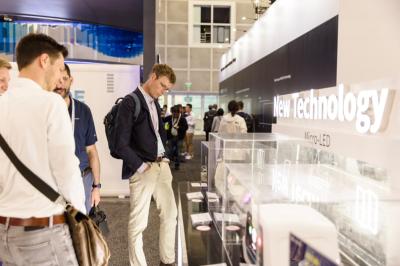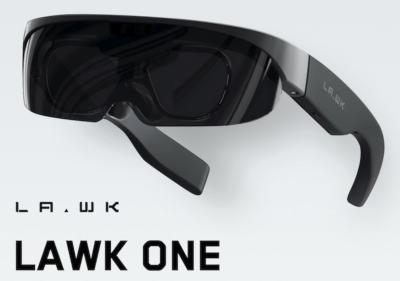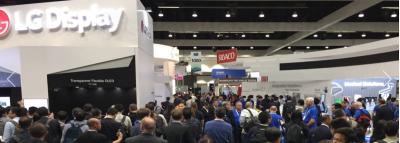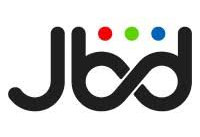 JBD (Jade Bird Display), established in 2015 in Shanghai, China, develops micro-LED based MicroDisplays for near-eye and image projection applications based on its proprietary hybrid monolithic integration technology.
JBD (Jade Bird Display), established in 2015 in Shanghai, China, develops micro-LED based MicroDisplays for near-eye and image projection applications based on its proprietary hybrid monolithic integration technology.
In July 2017 the company demonstrated a 5000 PPI active-matrix group III-V microLED array on Si ICs. In 2019 JBD unveiled more prototypes, including a 2 million nits display and a 10,000 PPI display.
In 2020, JBD became the first company to commercially produce microLED microdisplays - 0.3" VGA (640x480) monochrome (red, green and blue) displays. In 2023 JBD started shipping engineering samples of single-panel RGB microLED microdisplays.
In June 2022 JBD started building a $92 million USD display production line in Hefei. IN 2023, JBD said that its production line has commenced operation, and is producing microLED microdisplays.
1889 Hongyin Road
Lingang
Pudong New Area
shanghai
China
MicroLED startups raise over $200 million in the past year
In the past year, microLED startups have raised over $200 million. As some companies (most notably Aledia and JBD in this case) mature and start to build production capacity, the need for funds grows, and we have indeed seen large investment rounds in these companies.
- Kubos Semiconductors: $2 million (May 2024)
- MICLEDI: $17 million (March 2024)
- Mojo Vision: $21.1 million (October 2023)
- Aledia: $129 million (October 2023)
- Comptek Solutions: $8.6 million (August 2023)
- QNA Technology: $4 million (August 2023)
- JBD: A4 round, estimated at $30-130 million (June 2023)
It is great to see these recent funding successes, which will hopefully lead to increased innovation and also initial production. It should be noted that most (if not all) of these financing rounds have been finalized before Apple made its decision to cancel its main microLED wearable project. We do not see Apple's decision as having a major impact on the long-term viability of microLED technologies or on the industry - but we do know that some investors are now hesitant to invest in this market following Apple's project cancellation.
Vuzix to develop microLED-based AR display systems for Garmin
Vuzix announced that it has signed a multi-phase development contract with Garmin for next generation nano-imprinted waveguide-based display system. These systems will also use microLED microdisplay engines.
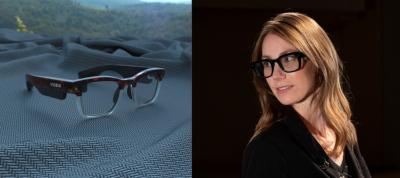
Vuzix will develop and deliver in succession, waveguide based optical systems with full custom microLED projection engines, and then ultimately production units.
Vuzix launches online sales of its microLED-powered Shield Smart Safety Glasses
In early 2022, Vuzix launched the Shield Smart Safety Glasses based on microLED microdisplays (JBD's VGA 0.13"). The Shield, powered by Qualcomm's Snapdragon XR1 and Vuzix' propriety waveguide optics, was targeting enterprise use.

A few days ago, Vuzix announced that the Vuzix Shield smart glasses are now available to the general public, available to buy online at Vuzix's site. The company says that the Vuzix Shield is its most revolutionary pair of prescription-ready AR smart safety glasses, boasting enhanced 3D optics made possible by the stereoscopic microLED waveguide-based displays. At $2,499.99, this is still an expensive device and it is not really intended for general consumer use.
MicroLEDs Will Make a Macro Impact
This is a guest post, by Ioannis (John) Kymissis
Micro light-emitting diode (microLED) technology is the bright young thing in the display world, literally and figuratively. Its high luminance, sharp contrast, and vivid colors, among other attributes, make this one of the most dynamic emerging technologies for next-gen display applications. We’re just beginning to see what the future holds for microLEDs and their potential impact on display and imaging capabilities.
On the Technology Fast Track
MicroLEDs have made rapid advancements since they were first submitted for patent in 1998. The Kansas State University researchers who developed these miniaturized versions of LEDs envisioned using them in sensors, detectors, and mini-displays. But now, in just under three decades, many major display leaders and emerging companies are racing to produce and integrate the technology in everything from smartwatches to TVs to automotive displays.
The LAWK ONE microLED AR glasses to launch next month
The LAWK ONE is an AR headset based on dual microLED microdisplays, aimed towards outdoor 'adventure' use, that has launched a successful crowdfunding campaign. The HMD is set to start shipping in December 2023, with a launch price of $349.
The microdisplays are JBD's 0.13" VGA green monochrome microLEDs. LAWK ONE says that the displays offer up to 1,150 nits of brightness and a 30-degrees FOV.
JBD starts shipping full-color RGB microLED microdisplay samples
China-based MicroLED microdisplay developer Jade Bird Display have started shipping engineering samples of single-panel RGB microLED microdisplays. The company brands these new microdisplays as the Phoenix series, while its monochrome panels are now branded as Hummingbird. The Phoenix series is designed to be used with 50+ degree FOV waveguides.
JBD's first Phoenix samples are 0.22" panels, with a 2K resolution (2.5 um pixel pitch). The three LEDs (RGB) are all AlInGaN emitters, and are vertically stacked. JBD says that its plans for a standard product include a 0.3-inch panel with 4K resolution (2 um sub-pixel pitch. The company expects to begin full mass production in 2025.
JBD succesfully raised its A4 strategic financing round
According to reports from China, MicroLED microdisplay developer Jade Bird Display has successfully raised its A4 strategic financing round. It is reported that together with the A3 round which closed last year, the company raised "hundreds of millions of Yuan" (which could mean anything from $30 million USD to $130 million).
JBD's investors include Alibaba, Samsung, BYD and Geely. BYD is said to be working with JBD to develop MicroLED automotive applications.
JBD says its new microLED fab in Hefei is now starting display production
In June 2022 it was reported that JBD is building a $92 million USD display production line in Hefei. JBD now says that its production line has commenced operation, and is producing microLED microdisplays.
According to reports, the production line will have an annual capacity of around 120 million panels (likely JBD's 0.13" monochrome variant).
MicroLED technologies at SID Display Week 2023 - what to expect
SID Display Week is the display industry's premier display show and this year's event, which will take place on May 21-26, should be an excellent one.
Display Week covers all aspects of the display industry and the whole spectrum of display technologies. MicroLEDs are seen by many to be the next generation display technology, and there will indeed be an increased focus on microLED technologies and displays at the upcoming Display Week.
MicroLEDs at Electronic Displays conference: a talk with conference chairman Prof. Karlheinz Blankenbach
The European Electronics Display Conference (edC), which takes place next week at Nuremberg, Germany, is a leading display conference, which takes part as part of the embedded world event. The conference focuses on industrial and automotive displays, and includes two days of keynote speeches and sessions.
MicroLEDs are featured at the conference, as the organizers realize the importance of the next-generation display technology. We had a short talk with the conference charimen Prof. Dr. Karlheinz Blankenbach from Pforzheim University's Display Lab.
Q: Thanks for taking the time to talk with us, Dr. Karlheinz. Can you tell us a bit about the Electronic Display Europe Conference?
Pagination
- Page 1
- Next page



